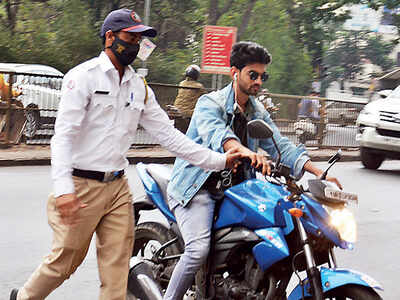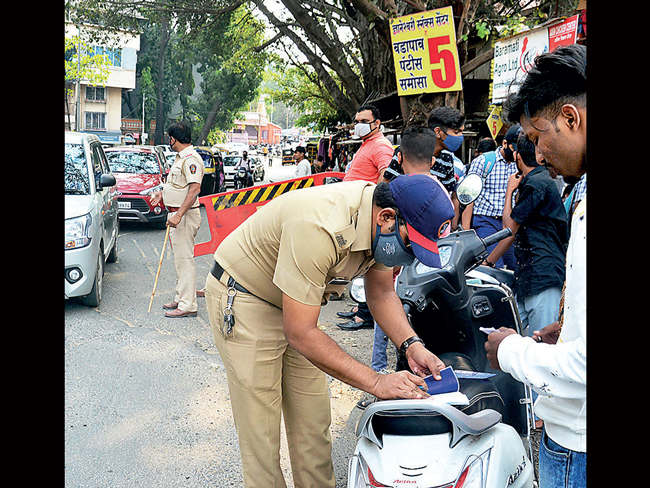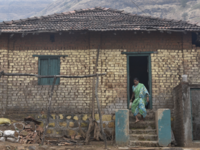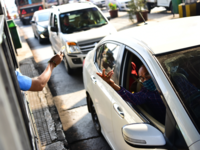PMC and cops have no system to track repeat offences of roaming unmasked

PIC: MAHENDRA KOLHE
INEFFICIENCY UNMASKED
Despite declaring steep Rs 1,000fine against repeat offenders for not wearing masks amid rising COVID cases and FIRs if they argue, the fact is that the authorities have no mechanism to tell if this is someone’s first or twentieth time of breaking pandemic rules
The sudden repeat spike in COVID-19 cases in the city has alarmed one and all, galvanising the authorities into taking preventive steps before things worsen, like during the peak of the pandemic last year. In this vein, thePune Municipal Corporation (PMC) and city police have once again issued new health safety guidelines and started cracking down on people not wearing masks in public. In fact, within just a week, over 7,000 citizens have already faced action for this violation.
Interestingly, as per the stricter new norms, standing instructions have been issued to charge double the fine — Rs 1,000 — if the offence of roaming around unmasked is repeated.

Further, FIRs are to be lodged against anyone who argues with or obstructs government servants from discharging their duties while recovering fines from repeat offenders. The aim of this all, officials said, is to hammer home the seriousness of the pandemic situation and create some fear about hefty penalties and prosecution.
And yet, the same officials seem to have once again forgotten that there is no system in place to support their tall claims. Despite provisions to charge double penalty from repeat offenders, PMC and the police have no mechanism to keep a record of offenders — and hence, have no clue if this was their first mistake or a repetitive one.
As a result, the authorities are unable to show a single case wherein they have charged a repeat offender. And, with no record maintained, there has not been even oneFIR reported against any such individual. Thus, the purpose of these strictures is being defeated entirely.
The issue came to light recently only after some sanitation inspectors attached with PMC’s solid waste management department raised the issue. “Since there is no computerised system or software to keep track of maskless offenders, we are helpless when it comes to charging double penalties. No offender will admit that it was their second or third offence! We have asked how to remedy this scenario to our seniors,” said a sanitation inspector serving with Kothrud ward office.
At present, PMC officials, Pune police and railway police have been authorised to recover such fines from their respective jurisdictions. After recovering the fine, a hard copy of the challan is issued to offenders. But those working on ground admitted that the move is largely pointless. “The missing mechanism defeats the purpose. Few fear paying up Rs 500. Just like the e-challan system for traffic violators, a similar system is needed here,” said a traffic constable deployed at Shivajinagar.
Deputy commissioner Madhav Jagtap, who heads the anti-encroachment and solid waste management department, agreed, “It is true that there is no mechanism to detect repeat offenders, and that we need to create a software for this purpose. Since the number of maskless offence is very high, it is a mammoth task before the authorities and will require huge manpower and time. So, we are trying to create alternative arrangements wherein records of offenders can be maintained for smooth execution of rules. We are also taking help from police to create this arrangement.”
However, cops were clear that they are not responsible for these logistics. On condition of anonymity, a senior police officer said, “We are helping PMC recover fines from offenders. There is no doubt that we get our share from the revenue being generated, but it is their responsibility to create a system or software within which repeated offenders can be identified and punished.”
So far, since June 2020, some five lakh individuals have been fined and paid a total of up to Rs 18 crore in cash penalties for not wearing face masks in public.
Despite declaring steep Rs 1,000
The sudden repeat spike in COVID-19 cases in the city has alarmed one and all, galvanising the authorities into taking preventive steps before things worsen, like during the peak of the pandemic last year. In this vein, the
Interestingly, as per the stricter new norms, standing instructions have been issued to charge double the fine — Rs 1,000 — if the offence of roaming around unmasked is repeated.

Officials on ground revealed that they have not charged a single person a fine for repeat offence, because obviously nobody will admit to it for a higher fine
Further, FIRs are to be lodged against anyone who argues with or obstructs government servants from discharging their duties while recovering fines from repeat offenders. The aim of this all, officials said, is to hammer home the seriousness of the pandemic situation and create some fear about hefty penalties and prosecution.
And yet, the same officials seem to have once again forgotten that there is no system in place to support their tall claims. Despite provisions to charge double penalty from repeat offenders, PMC and the police have no mechanism to keep a record of offenders — and hence, have no clue if this was their first mistake or a repetitive one.
As a result, the authorities are unable to show a single case wherein they have charged a repeat offender. And, with no record maintained, there has not been even one
The issue came to light recently only after some sanitation inspectors attached with PMC’s solid waste management department raised the issue. “Since there is no computerised system or software to keep track of maskless offenders, we are helpless when it comes to charging double penalties. No offender will admit that it was their second or third offence! We have asked how to remedy this scenario to our seniors,” said a sanitation inspector serving with Kothrud ward office.
At present, PMC officials, Pune police and railway police have been authorised to recover such fines from their respective jurisdictions. After recovering the fine, a hard copy of the challan is issued to offenders. But those working on ground admitted that the move is largely pointless. “The missing mechanism defeats the purpose. Few fear paying up Rs 500. Just like the e-challan system for traffic violators, a similar system is needed here,” said a traffic constable deployed at Shivajinagar.
Deputy commissioner Madhav Jagtap, who heads the anti-encroachment and solid waste management department, agreed, “It is true that there is no mechanism to detect repeat offenders, and that we need to create a software for this purpose. Since the number of maskless offence is very high, it is a mammoth task before the authorities and will require huge manpower and time. So, we are trying to create alternative arrangements wherein records of offenders can be maintained for smooth execution of rules. We are also taking help from police to create this arrangement.”
However, cops were clear that they are not responsible for these logistics. On condition of anonymity, a senior police officer said, “We are helping PMC recover fines from offenders. There is no doubt that we get our share from the revenue being generated, but it is their responsibility to create a system or software within which repeated offenders can be identified and punished.”
So far, since June 2020, some five lakh individuals have been fined and paid a total of up to Rs 18 crore in cash penalties for not wearing face masks in public.
GALLERIES View more photos
























Recent Messages ()
Please rate before posting your Review
SIGN IN WITH
Refrain from posting comments that are obscene, defamatory or inflammatory, and do not indulge in personal attacks, name calling or inciting hatred against any community. Help us delete comments that do not follow these guidelines by marking them offensive. Let's work together to keep the conversation civil.